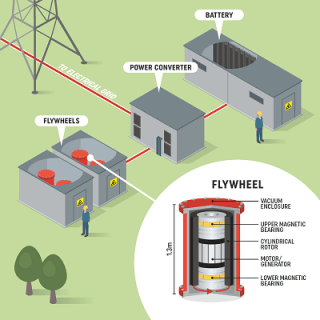Jun 5 2017
As part of a new project comprising of Engineers from the University of Sheffield, Schwungrad Energie, Adaptive Balancing Power and Freqcon, Europe’s largest and the UK’s first battery flywheel system will be connected to the UK and Irish grids to help respond to energy demand.
 Credit: University of Sheffield
Credit: University of Sheffield
The €4 million euro project, with €2.9 million coming from the EU’s Horizon 2020 scheme, will create a ground-breaking flywheel battery hybrid energy storage system aimed at stabilizing pressure on the prevailing grid infrastructure in Europe.
Flywheels function by accelerating a rotor to great speeds using electrical energy, successfully storing the energy within the system as rotational energy, to be converted back to electricity when needed. Flywheels do not degrade over time compared to batteries so joining the two enables the storage system to function more efficiently and decrease costs over the system’s lifetime.
The new project, coordinated by Schwungrad Energie Limited, involves partners Adaptive Balancing Power GmbH who will supply their state-of-the-art adaptive flywheel technology. Freqcon GmbH will design and construct scalable multi-source power converters to connect the flywheels to the grid.
The UK national grid is becoming increasingly volatile due to the rising share of intermittent renewable energy sources. This manifests itself in deviations from the nominal 50Hz frequency as demand outweighs supply or vice versa. Battery and flywheel technologies can offer a rapid response, and can export and import energy enabling this technology to respond to periods of both under and over frequency.
Dr. Dan Gladwin, Department of Electrical and Electronic Engineering, University of Sheffield
In the principal stage of the project, the flywheel facility will be installed in Ireland, piloted by Schwungrad Energie Limited at their hybrid flywheel battery facility, which has already seen a positive and highly favorable demonstration project, in partnership with EirGrid. The flywheel system’s peak power capacity will be 500kW and storage will be 10kWh of energy.
The system will then be set up at the University of Sheffield’s 2MW battery facility at Willenhall near Wolverhampton. The grid-connected research facility is one of UK’s largest and fastest battery storage systems.
The flywheels will be upgraded to supply 1MW of peak power and 20kWh of energy storage and will be used as a hybrid energy storage system with the batteries to deliver frequency response services.
Rapid acting frequency response services, such as those provided by this hybrid solution, are a main enabler to the attainment of a high penetration of renewables – recognized by the Irish System Operators DS3 Programme for System Services.
More precisely, energy storage is a top priority for the UK government, with a policy by the Department of Business, Energy and Industrial Strategy (BEIS) anticipated later in the year.
A recent report by the National Infrastructure Commission has proposed that energy storage could contribute to innovations that could save consumers £8 billion annually by 2030 as well as securing the UK’s energy supply for several years.
The University of Sheffield is renowned as an expert hub for energy storage research in the UK and home to the top Centre for Research into Electrical Energy Storage & Applications (CREESA).
The existing Hybrid Flywheel-Battery Facility has concluded a trial with EirGrid, successfully demonstrating the technology’s capability to rapidly inject power following a frequency event. When implemented at commercial scale the technology will assist in overcoming the challenges of operating a power system with increased levels of renewables. The adaptive flywheel and multi-source inverter being demonstrated by this project have the potential to increase the competitiveness of the solution.
Jake Bracken, Schwungrad Energie
Norbert Hennchen, CEO of Freqcon GmbH, said: “Increasing renewable penetration is a huge challenge for grid stability worldwide, and our company is at the forefront of developing innovative grid support solutions, based on our leading-edge power converters. We are delighted to be part of this consortium to develop and demonstrate the Flywheel-Battery Hybrid Technology.”
Dr Hendrik Schaede from Adaptive Balancing Power, added: “We are proud to work in this great consortium on the future of our power grids, making them economic and reliable while CO2-emissions are further reduced. Irish and English grid operators currently hold a pioneering role by developing up-to-date regulations for grid stabilisation measures, which means we can test grid stabilisation technology in the project. Our adaptive flywheel technology allows us to tailor the flywheels’ properties to the requirements set up by regulations and local conditions, leading to a high efficiency while providing the grid services at lowest costs.”